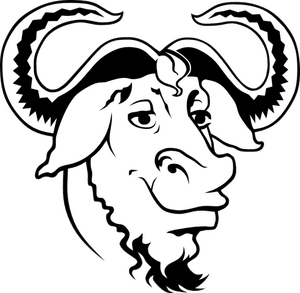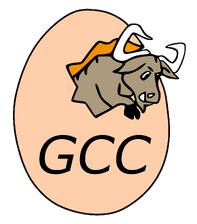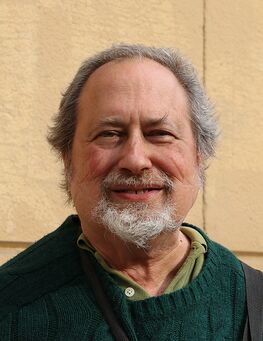
GNU (Pronounced with a hard "g," like "grew" but replace the "r" with a "n,")[1] is a dedicated organization for free software with development of their immense list of software[2]; although you can technically use it as a standalone operating system because of its arrival with all the necessities an operating system may need to functional appropriately, it is largely mixed in with other developed software whether it is free or proprietary: A few are GNU/Linux, MacOS, Unix-based/like OS, and even Windows. Due to GNU's License, majority of it is covered by the GPL made by the GNU Project.
GNU's founder, Richard Matthew Stallman developed the project to fight against the proprietary software of the time; additionally, as a free software activist, he wanted users all over the world to be granted powers over their computer and allowing users to freely run, copy, share, distribute, and modify any software.
GNU's Name
The name "GNU" is a recursive acronym; Because of its Unix-like property, the acronym's full form is "GNU's Not Unix!"[3], though it does differ from it in many ways but more blatantly, it contains no Unix Code, hence, the "Not Unix" part of its name. Adding on, he also found inspiration in the song named "The Gnu."[4]
Included Software / Components

As of June 2024, the GNU project currently holds 394 active packages, but including the decommissioned packages puts the total up to 467.[5] There are some key components: GNU Compiler Collection (GCC) made for the compiling of C, GNU C library (glibc) containing additional resources and ensure quality-of-life components are included, and GNU Core Utilities (coreutils) for any necessary software, but contains more packages that are deemed required for a fully stable operating system.
Overall, these components are in many operating systems, mainly because of how easy GCC is to access for any developer. Because of Richard Stallman, he was able to open source the variety of tools and software developed for the GNU project and in turn, pushed forward for the movement of open and free software for all.[6]
History of GNU

Initiated by Richard Stallman whilst working at MIT's Artificial Intelligence Laboratory on September 27th, 1983, he announced the initialization of the GNU project[6] though the development was delayed until January 5th, 1984. Stallman would quit his job in order for him to successfully distribute GNU without interference from his job, whether they delay him or take over GNU.[7]
With its release, also came with its decision to convert to a more Unix-compatible architecture because Stallman uncovered how Incompatible Timesharing System (ITS) was obsolete as it was written in Assembly. Stallman decided development of such system will be coded in C and Lisp, although compatible with Unix, being Unix-like, it did not use any code provided by Unix because of Stallman's beliefs.[8]
Although everything had to be written from scratch, it did not stop development from striving, even if development had to use third-party free software components. Most of GNU was written by volunteers whether it be purely voluntarily or paid by companies. October 1985, Stallman would set up the FSF (Free Software Foundation). The FSF hired developers to help write software needed for GNU.[9][10]
References
- ↑ How to Pronounce GNU, The GNU Project, Let Proprietary Software Be A Thing Of The Past!
- ↑ List of All GNU Packages, Wikipedia, Wikipedia, The Free Encyclopedia.
- ↑ The Free Dictionary, Definition 1, The Free Dictionary By Farlex
- ↑ "The Free Software Movement and The Future Of Freedom,", Zagreb, Croatia: Free Software Foundation Europe.
- ↑ Software, GNU Project, Let Proprietary Software Be A Thing Of The Past!
- ↑ 6.0 6.1 Free Unix!, Richard Stallman. September 27th, 1983, New Unix Implementation
- ↑ Inter/vention: Free Play in the Age of Electracy, Holmevik, Jan Rune; Bogost, Ian; Ulmer, Gregory, March 2012
- ↑ Open Sources 2.0: The Continuing Evolution, DiBona Christ; Stone, Mark; Cooper Danese, October 2005.
- ↑ The Software Industry, Peter Buxmann, Diefenbach, Thomas Hess, September 30, 2012.
- ↑ The Linux Programming Interface: A Linux and UNIX System Programming Handbook, Kerrisk, Michael (October 2010)
